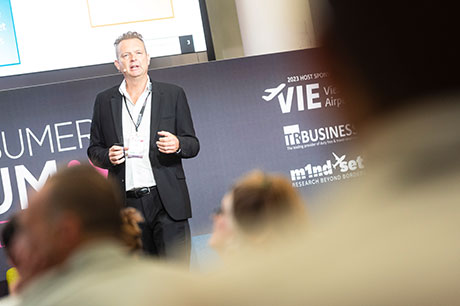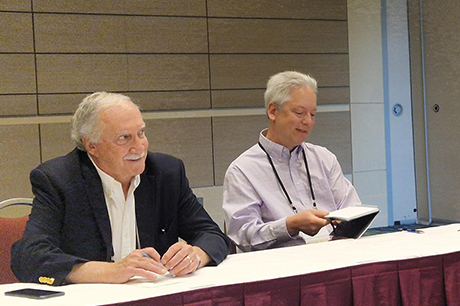Duty free gets a reality check at Hamburg GSF event
By Kevin Rozario |
In the afternoon session of the recent Global Shopping Forum in Hamburg [click here for the morning session], Kian Gould, CEO & Founder of AOE (an e- commerce and digital transformation company ) gave the most interesting presentation of the day.
He took a critical look at the duty free and travel retail industry, highlighting the disparity between growing pax numbers and falling sales. He also noted that even in the most buoyant region of Asia Pacific, DF&TR annual growth had fallen drastically and steadily from +25.5% in 2011 to less than +3% last year.
“This is a trend, and it can only be reversed by participating in, rather than fighting, the digital transformation,” he said. “When the pie gets smaller, partnership is key, and stakeholders (airports, airlines, brands, retailers) need to start collaborating in digitalising the entire travel journey.”
Pointing out that airports had ignored the shift to mobile usage and how people interact with their devices, he added: “Airports are not an experience, they’re an annoyance. They used to see other airports as competitors but now everyone is looking for a piece of the pie. Disruption is so fast. There is little incentive to buy anywhere except online.”
He believes that passengers don’t bother with airport apps because they are not interactive or updated enough. “Airports have not provided the technology that people are looking for and have not really worked on enhancing the retail experience,” stated Gould.
He was also clear that an omni-channel approach to airport retail was not about click-and-collect, which in fact means arriving at the airport much earlier and perhaps queuing to get your item – not the most convenient way to shop. “What’s the point in that?” he said.
“Travel retailers need to be talking to people at the airport – while they are looking at their devices and while they are receptive.” An example of this is a project that AOE has engaged in for the Lufthansa lounges at Frankfurt Airport where shopping for passengers in these locations has been made possible so that they don’t have to leave the lounge or physically go to the shops.
THE ALL-DIGITAL JOURNEY
That convenience extends to shipping to travellers’ homes, or their airline seat which, he claims, would make more sense. However, this requires stakeholders “to stop looking at each other as competition, but as syndicators that can share information about the passengers and deliver appropriate digital experiences”.
At Frankfurt Airport, AOE has attempted to fully digitalise the airport journey and any services that FRA offers, from booking shuttle services or car spaces, to ordering products for gate delivery (which can be complex if there are gate changes, missed flights etc).
In the first phase of the project, Heinemann was part of it being the biggest retailer at the airport, plus three others. In the second phase AOE included 20 retailers and two to three are now being added every month.
The advantage of an omni-channel approach is that it can work for everyone, not just a select few – but it can also be used to target specific shoppers like the Chinese, which FRA does. Gould said that through this project, Frankfurt Airport and Lufthansa were now working together. “That’s revolutionary because airports and airlines have never done it to this extent… and it’s only the beginning,” he believes.
Gould also made the key point that airports and airlines in the Middle East often have the same (government) ownership. “They won’t be competing against each other,” he noted, the unsaid inference being that if European airports and airlines did not do the same – and quickly – they could be left behind in the digital race.
BAIT & SHARE
In the next presentation. David Klemm, Head of Acceptance Development Germany at financial services group, Mastercard, discussed how to market to time-poor travellers and how to convince them to share their data. He argued that they would do this if they got a personalised experience in return.
Travel apps already make relevant personal suggestions, and this is better than receiving a €5 voucher he said. Klemm believes that, in the future, data sourced from our daily lives will be combined with beacons, for example, to deliver the correct purchase suggestions.
Mastercard holds large amounts of useful data from transactions. For example, at specific places such as sports grounds or festivals, buyer behaviour for F&B can be analysed in great detail. The company can also benchmark restaurants where the card usage is high to determine sudden changes in sales – and what might be the mitigating factors.
CREATING THE RIGHT EXPERIENCE
Such analysis could well be used by Value Retail, the operator of outlet villages across Europe and further afield. Value Retail’s Business Director Germany, Kay Niehaus, described its first site, Bicester Village in Oxfordshire as London Heathrow’s Terminal 6, due to the high numbers of tourists – the Chinese in particular – who go there.
“We are experts in creating retail platforms where brands are represented in a very good way; we’re not just about hunting for a bargain,” he emphasised. His presentation was less about the digital world and more about the experience that his company goes to great lengths to achieve. “Many of our guests would not typically go to a Gucci or Prada store but they do it with us because they know they can go in and afford the products because they are 30-40% off.”
For high-end brands this offers them a new channel and new consumer target which they would not normally be able to access.
Niehaus says that the types of guests fall into distinct groups who are targeted differently through varied experiences. “We are not a shopping mall we’re a luxury destination with services such as personal shopping and VIP lounges.” The company has a tourism manager in every village and is also investing in hospitality directors who come from the hotel industry in order to build experience in this area.
In the same way, airports need to bring in people from completely different world’s to look at the offer with fresh eyes in order to give passengers a new visual experience, believes Niehaus. “We do not want to have the same look and feel every day,” he says– one lesson airport retailers might do well to learn.

Breckwoldt discussed TripAdvisor’s expertise in consumer sharing of information and why that has led to 350m monthly users.
‘PEOPLE LOVE TO SHARE’
Tom Breckwoldt, Territory Manager Germany, Austria & Switzerland at TripAdvisor [the world’s largest travel social media site] stressed the highly interactive nature of the site through the uploading of reviews and images of hotels and restaurants, as well as airlines. The site gets over 250 reviews every minute!
“People love to share,” he said, something FB knows all too well, and this sharing also provides an opportunity to build up a consumer profile. Of TripAdvisor’s roughly 350m monthly users, about half now access the site via mobile, making this platform another that airports might have an obvious affinity with when looking to target passengers.
TRBusiness was not present to hear the final two presentations of the day – but we contacted the speakers to provide us with a summary.
André Wessoly, Senior Vice President Sales EMEA at Flio, the global airport app, summarised the advantages of having a centralised source for “all things airport” such as automatic connection to free wifi at different gateways, money-saving discounts, and offers on airport services, retail and food and beverage.
He emphasised that the app generates commercial revenues for airports, brands and retailers and that “38% of our active audience interact with Flio prior to their departure date”. Flio now also allows airports to market the app as ‘their own’ with a dedicated section in their own existing style. The company also offers airports a percentage of brand revenue sold via their section which effectively means they can “earn revenue from brands without lifting a finger”.
UNDERSTANDING ‘CHINSUMERS’
The final presentation of the day came from Xin Deng, Managing Director of China Smiling, a start-up that markets brands and retailers directly to Chinese travellers via their social media or travel sites such as WeChat or AliTrip, prior to them travelling abroad.
Deng describes these travellers as Chinsumers and broke them down into three segments: regular travelling shoppers, Haitao cross-border online shoppers, and Daigou representative buyers (for others). All three groups are heavily influenced by word-of-mouth which is why China Smiling interacts with them before they travel and after they come back and are leaving comments or reviews on websites.
Brands need to be aware of this whole process in order to, not just gain a sale, but have favourable online commentary afterwards – which could multiply future sales. Brand awareness and business reach to Chinese travellers are therefore both essential to drive new sales and retain – and gain – customers, said Deng.
Alcohol insights: Conversion up, spend down in Q4
Conversion of visitors in the alcohol category in duty free has risen to 54% in Q4 2023,...
Heinemann Asia Pacific makes breakthrough in New Zealand at AKL
Heinemann Asia Pacific is set to enter the New Zealand market with three new retail concepts at...
Men buy and spend more in travel retail says new research by m1nd-set
Men have a higher conversion rate and spend more when shopping in travel retail, says new...

In the Magazine
TRBusiness Magazine is free to access. Read the latest issue now.

 Trbusiness. The travel retail Trbusiness. The magazine for global retail and duty free professionals.
Trbusiness. The travel retail Trbusiness. The magazine for global retail and duty free professionals.




























